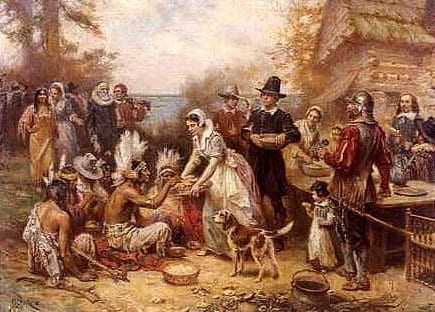| Notes |
- John - was the only one of the three HOWLAND brothers to come on the Mayflower, the other two brothers came over in 1624.
John Howland of the Mayflower was called by Governor William Bradford "a lusty younge man". He was one of the hired hands among the Mayflower company, being neither a "Saint," as the Pilgrims were called, nor a "Stranger," engaged for a specific duty, as was the soldier, Captain Myles Standish. During the voyage across the North Atlantic, the Mayflower was buffeted by severe autumn storms during which she was forced to drop her sails and head into the wind, wallowing in the mountainous waves. John Howland ventured on deck and was washed overboard into the boiling sea. In governor Bradford's words, "It pleased God that he caught hould of ye halliards which hunge over board, and rane out at length; yet he was held up... and then with a boat hooke and other means got into ye ship again." It was this tenacity of purpose, perseverance, and the ability to deal with unexpected emergencies that helped John Howland to become a successful leader in the Plymouth community.
His was the 13th name of 41 persons who signed the memorable compact in the cabin of the Mayflower in "Cape Cod Harbor" in Nov 1620. He signed on as a manservant Mr. John Carver. "A profitable instrument of good; the last man that was left of those that came over on the ship called the May Flower..." - Plymouth Col. Recs.
The Carver family with whom John lived, survived the terrible sickness of the first winter, during which many Pilgrims died. But the following spring, on an unusually hot day in April, governor Carver, according to Bradford, came out of his cornfield feeling ill. He passed into a coma and "never spake more." His wife, Kathrine, died soon after her husband. Since the Carvers had no children, John Howland is thought to have inherited their estate. It has been said that he immediately "bought his freedom" but no record has survived.
From "One Hundred and Sixty Allied Families" by John Osborne Austin - 'A lusty young man (called John Howland) coming upon some occasion above the grating was with a seele (Sail) of the ship thrown into the sea, but it pleased God that he caught hold of the topsail halyards which hung overboard, an ran out at length, yet he held his hold (though he was sundry fathoms under water) till he was hauled up by the same rope to the brim of the water, and then with a boat hook and other means got into the ship again.'
When the Mayflower was yet in Cape Cod Harbor, ten of her "principal men", including John, were sent out in a boat, manned by eight sailors, to select a place to establish a longed-for home for the weary band. A storm drove them into Plymouth harbor, and Plymouth was selected as the place of settlement.
John Howland, Sr., died in rocky Nook 23 February 1672/3. In his will dated 29 May 1672, John mentioned his beloved wife, Elizabeth, and his children, named as John, called "eldest son, " Jabez, Isacke, and Joseph, and his married daughter, Desire Gorum(sic), Hope Shipman, Elizabeth Dickinson, Lydia Browne, Hannah Bosworth and Ruth Cushman. John Howland also mentioned his grandchild, Elizabeth howland, "daughter of son John". The inventory of his estate included his dwelling house in Rocky Nook, medow at the Jones River, half of a house and medow in Colchester, a medow near the Jones River bridge in Duxborrow, a house and land in Middlebury, and land near Nemassekett Pond. Also listed among his possessions were "one great Bible and annotations on the five books of Moses", as well as "Mr. Tindall's workes, Mr. Wilson's workes and seven more books."
|



 d. 17 May 1635, Fenstanton, Huntingdon, England, United Kingdom
d. 17 May 1635, Fenstanton, Huntingdon, England, United Kingdom 
 d. 21 Dec 1687, Swansea, Bristol, Massachusetts, United States
d. 21 Dec 1687, Swansea, Bristol, Massachusetts, United States  (Age 80 years)
(Age 80 years) 
 d. Yes, date unknown
d. Yes, date unknown d. Yes, date unknown
d. Yes, date unknown d. Yes, date unknown
d. Yes, date unknown (Age 52 years)
(Age 52 years) d. Jan 1704 (Age 67 years)
d. Jan 1704 (Age 67 years) d. Yes, date unknown
d. Yes, date unknown d. Yes, date unknown
d. Yes, date unknown d. Yes, date unknown
d. Yes, date unknown = Link to Google Earth
= Link to Google Earth 




